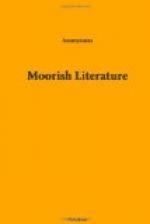Another no less celebrated in Morocco, Sidi Abdan Rahman el Medjidont, is, they say, the author of sentences in four verses, in which he curses the vices of his time and satirizes the tribes, and attacks the women with a bitterness worthy of Juvenal:
“Morocco
is the land of treason;
Accursed
be its habitants;
They
make guests sleep outside,
And
steal their provisions."[3]
[3] H.J. Castries. Les Gnomes
de Sidi Abdir Rahman El Medjedoub. Paris,
1896.
“Deceptive women
are deceivers ever,
I hastened to escape
them.
They girdle themselves
with vipers,
And fasten their gowns
with scorpions.”
“Let not thyself fall victim to
a widow,
Even if her cheeks are bouquets,
For though you are the best of husbands,
She will repeat ceaselessly, ‘God,
be merciful to the dead.’”
“No
river on the mountains,
No
warm nights in the winter,
No
women doing kind actions,
No
generous-hearted enemies.”
The battle of the Guadalete, where sank the Visigoth empire, delivered Spain almost defenceless to the Arab and Berber conquest. There developed then a civilization and an intellectual culture far superior to those of the barbarous Christian refugees in the Asturias, where they led a rude and coarse life which but seasoned them for future struggles. Of their literary monuments, there remain to us but mediocre Latin chronicles. The court of the Omayades at Cordova saw a literature blossom which did not disappear even after the fall of the Khalifate. On the contrary, it seemed to regain a new vigor in the small states which surged up about the Iberian Peninsula. The Christians, under the domination of the Mussulmans, allowed themselves to be seduced by the Arabian literature. “They loved to read their poems and romances. They went to great expense and built immense libraries. They scarcely knew how to express themselves in Latin, but when it was necessary to write in Arabic, they found crowds of people who understood that language, wrote it with the greatest elegance, and composed poems even preferable in point of view to the art of the Arab poets themselves."[4]
[4] Dozy. Histoire des Mussulmans de l’Espagne, pp. 103-166. Leyden, 1861, in 12mo, 4to.
In spite of the complaints of fanatics like Euloge and Alvaro, the literary history of that time was filled with Christian names, either those of Spanish who had remained faithful to the ancient faith, or renegades, or children of renegades. By the side of the Arab names, like that of the Bishop Arib ben Said of Cordova, are found those of Ibn Guzman (Son of Guzman), Ibn el Goutya (son of Gothe), Ibn Loyon (son of Leon), Ibn er Roumaye (son of the Greek), Ibn Konbaret (son of Comparatus), Ibn Baschkoual (son of Paschal), and all have left a name among letters.




